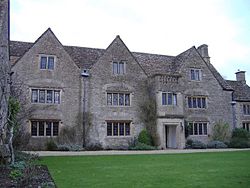
Lacock is a village and civil parish in the county of Wiltshire, England, about 3 miles (5 km) south of the town of Chippenham, and about 3.7 miles (6.0 km) outside the Cotswolds area. The village is owned almost in its entirety by the National Trust and attracts many visitors by virtue of its unspoiled appearance.

Chirton is a village and civil parish in Wiltshire, England, on the southern edge of the Vale of Pewsey about 5 miles (8 km) south-east of Devizes. The parish includes the hamlet of Conock, about half a mile west of Chirton village.

Grafton is a civil parish in Wiltshire, England, in the Vale of Pewsey about 7 miles (11 km) southeast of Marlborough. Its main settlement is the village of East Grafton, on the A338 Burbage - Hungerford road; the parish includes the village of Wilton and the hamlets of West Grafton, Marten and Wexcombe.

Box is a large village and civil parish within the Cotswolds Area of Outstanding Natural Beauty in Wiltshire, England, about 3 miles (5 km) west of Corsham and 5 miles (8 km) northeast of Bath. Box also falls in the easternmost part of the Avon Green Belt. Besides the village of Box, the parish includes the villages of Ashley and Box Hill; Hazelbury manor; and the hamlets of Alcombe, Blue Vein, Chapel Plaister, Ditteridge, Henley, Kingsdown, Middlehill, and Wadswick. To the east the parish includes much of Rudloe, formerly a hamlet but now a housing estate, and the defence establishments and related businesses on the site of the former RAF Rudloe Manor.

Biddestone is a village and former civil parish, now in the parish of Biddestone and Slaughterford, in northwest Wiltshire, England, about 3 miles (5 km) west of Chippenham and 2 miles (3.2 km) north of Corsham. The parish includes the smaller settlement of Slaughterford.
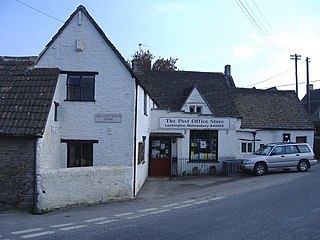
Luckington is a village and civil parish in the southern Cotswolds, in north-west Wiltshire, England, about 6+1⁄2 miles (10 km) west of Malmesbury. The village is on the B4040 road linking Malmesbury and Chipping Sodbury. The parish is on the county border with Gloucestershire and includes the village of Alderton and the hamlet of Brook End.

Bishopstone is a village and civil parish in Wiltshire, England, in the Ebble valley about 5.5 miles (9 km) south-west of Salisbury. The parish is on the county boundary with Hampshire and includes the small village of Croucheston and the hamlet of The Pitts.

Studley is a small village in the county of Wiltshire, England, in the civil parish of Calne Without.

Kington St Michael is a village and civil parish about 3 miles (4.8 km) north of Chippenham in Wiltshire, England.
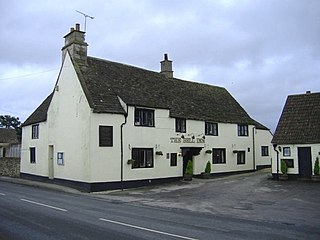
Yatton Keynell is a village and civil parish in Wiltshire, England. The village is on the B4039 road near Castle Combe, about 4 miles (6 km) northwest of Chippenham, and about the same distance to the east of the county border with South Gloucestershire.

Allington is a hamlet in north Wiltshire, England. It is on the edge of the market town of Chippenham, about 2 miles (3 km) north-west of the town centre and about 0.3 miles (500 m) north of the A420 road towards Bristol.

Ditteridge is a village in the civil parish of Box, Wiltshire, England. It is about 0.8 miles (1.3 km) northwest of Box village and 3.5 miles (6 km) west of the town of Corsham. Formerly a larger settlement, it has an early Norman church and had its own civil parish for a time in the 19th century.
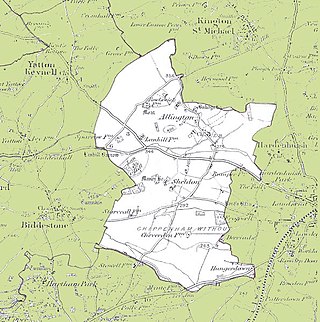
Chippenham Without is a civil parish in Wiltshire, England, created as a separate entity from the parish of Chippenham by the Local Government Act 1894 and largely consisting of farmland to the west of Chippenham, towards Biddestone. Of note within it are the ancient settlements of Allington and Sheldon, the latter with its manor house. The population taken at the 2011 census was 208.
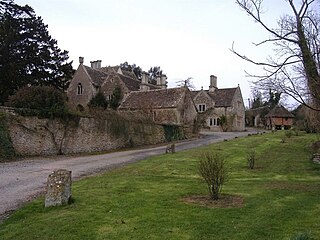
Sheldon Manor near Chippenham, Wiltshire, England, is Wiltshire's oldest inhabited manor house and dates back to Anglo-Saxon times. Its structure is mostly 17th-century, and it is a Grade I listed building.

Lucknam Park is a luxury hotel, spa and restaurant in west Wiltshire, England, about 3 miles (5 km) north-west of Corsham and 7 miles (11 km) north-east of Bath. The core of its building is a Grade II listed country house built in the late 17th or early 18th century. The hotel's restaurant has held one star in the Michelin Guide since 2006.

The Manor House is a 17th-century country house hotel in Castle Combe, Wiltshire in the south of England.
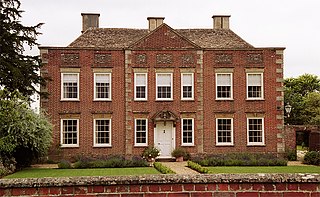
Tockenham is a village and civil parish in north Wiltshire, England. The village is about 1.2 miles (1.9 km) east of Lyneham and 3 miles (5 km) southwest of the town of Royal Wootton Bassett. The parish includes the hamlet of Tockenham Wick.

Cranborne Manor is a Grade I listed country house in Cranborne, Dorset, in southern England.
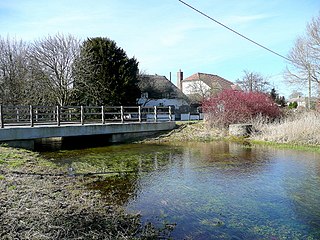
Newton Tony is a rural English village and civil parish in the county of Wiltshire, close to the border with Hampshire. Situated in the Bourne Valley, Newton Tony is about 9 miles (14 km) north-east of its post town, Salisbury. Wilbury House, a Grade I listed 17th-century mansion, stands in parkland in the north of the parish.

Blackland is a hamlet and former civil parish, now in the parish of Calne Without, just south-east of the town of Calne, in Wiltshire, England. There is a 13th-century church and an 18th-century country house, Blackland House. In 1881 the parish had a population of 50.
